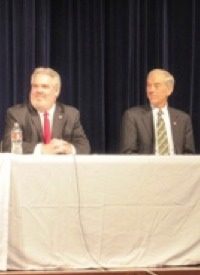
On Saturday, February 20, 2010, Congressman Ron Paul squared off against three opponents in the Republican primary for Texas Congressional District 14 during an hour-long debate as part of an afternoon-long "candidate forum" sponsored by the Katy Tea Party Patriots in the Performing Arts Center of Taylor High School in Katy, Texas, a suburban community on the western edge of the Houston metro area. Over 500 interested citizens attended.
In brief, individual interviews with this TNA reporter before the debate, opponents Tim Graney, John Gay, and Gerald D. Wall described Ron Paul respectively as “gallivanting around the country,” “ineffective,” and “in office way too long.”
The moderated debate format included opening statements from each candidate, short answers to questions on seven topics — foreign aid, earmarks, illegal immigration, national debt, healthcare, federal encroachments on state government, and the definition of “We The People” — followed by each candidate’s closing statement.
During the discussion of topics, each candidate also had the option of using as many as two 30-second periods to make comments or to clarify answers. The most memorable use of this option occurred about 25 minutes into the debate. Tim Graney, the most capable challenger, used 30 seconds to criticize Ron Paul for rarely ever getting a bill passed into law: “That’s not effective representation, and we need new representation in the district.”
Ron Paul immediately responded by using one of his own 30-second periods to explain that if you “play ball and do what they [other Congressmen] do,” then “you can get some bills passed. But — it takes time to change the course of history, to change the course this country’s been on for so many years” — which is precisely what Ron Paul has been doing.
This open attack and its immediate rebuttal may have been a turning point in the debate. Sniping against Ron Paul continued, but from this point on, none of the candidates invoked another 30-second period.
Throughout the debate, Ron Paul’s answers provided a gold mine of constitutional insights into each topic under discussion. Within the limitations of the debate format, he was able to parry many of the verbal thrusts of his inexperienced opponents and to articulate what must be done in order to preserve our liberty.
For example, on the topic of our growing national debt, Ron Paul warned that, by following our current fiscal course, we are going to “spend ourselves into oblivion,” and he emphasized the need to cut military expenditures:
If you think we should run the world, and have troops in 140 countries, have 700 bases overseas, and we can’t cut a $1 trillion empire around the world … It doesn’t even contribute to our national defense, it [puts] us in greater danger because we are overseas doing these things. It’s not defense! It’s what Eisenhower called it — a military-industrial complex … running the show now. There are many people who think that the military budget is sacred and it creates jobs. War never creates a good economy.
This answer put Tim Graney on the defensive in his response, as follows: “I don’t view America as having an empire. Our military’s the greatest this world has ever seen. We have never used it to take from others — we have only used it in defense of our freedom and the freedom of others. And they should be applauded and saluted for that.”
Clearly, there’s a significant disagreement between Ron Paul and Tim Graney on this topic. Let us further analyze this question of military expenditures: Who really benefits when Republicans sidestep the Constitution and permit the Federal Reserve unconstitutionally to print money while the military-industrial complex produces war matériel for undeclared (and hence unconstitutional) wars?
Answer: the bankers and the corporations.
This analysis leads to the shocking confirmation of the truthfulness of Froma Harrop’s brazen generalization about the political identity of most Republicans in a recent article on the federalizing of health care: “Most Republicans aren’t conservatives at all. They’re corporate socialists. The party’s idea of market solutions is to see how many taxpayer dollars they can shovel into private coffers. Recall the Medicare drug benefit, which was designed to enrich drug companies and insurers — while being entirely paid for with borrowed money.” (Emphasis added.)
No doubt Harrop would view the federal government’s expenditures on the two undeclared (and hence unconstitutional) wars in Iraq and Afghanistan from a similar perspective: borrowed money, enriching corporations and bankers. And from the perspective of a constitutionalist like Ron Paul — she’s right, even though she’s never bothered to take seriously the difference between constitutional and unconstitutional expenditures!
In his closing statement for the debate, Ron Paul summarized his faithfulness to the Constitution: “We should live up to our Constitution, and only Congress can declare the war, and the President should never be allowed to go to war.… We need to be sticklers for the Constitution.”
Organizers at the Katy Tea Party Patriots said that a link to this debate will be posted at www.katytea.com. The Congressional District 14 portion of the forum can be accessed at www.YouTube.com\bryanxt.
Constitutionalists can definitely benefit by thoughtfully examining the substance of this debate.
Photo of Tim Graney (left) and Ron Paul: Ken Hoover



